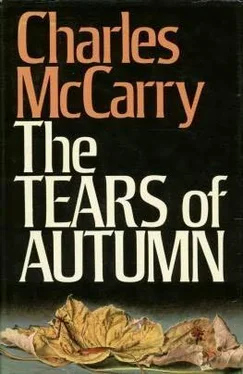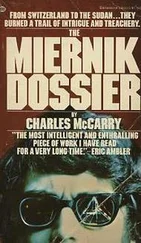“Do you think they killed Oswald?”
“No,” Christopher said. “If I’m right about how they handled him, it would have been wasteful. He didn’t know who they were. They must have told him they’d get him out after the shooting, set him up as a hero under a fake identity. He would have believed that.”
Patchen said, “They had to find somebody Oswald would trust. Someone he already knew.”
“Who did he know? Nobody. All they needed was someone under discipline; the contact had to have bona fides. Probably a Communist of some kind.”
“But how did they know about Oswald?”
“They went looking. He must have been in a lot of card files,” Christopher said. “They had to have an American gunman. Only a nut would do it-no professional killer is going to shoot the President of the United States. Gangsters are too patriotic.”
“How much have you put together?”
“Only the probabilities-but it’s clear enough why they had to run the operation,” Christopher said. “The psychology can’t be questioned. They believed Kennedy had done this thing to them-whether he did or not doesn’t matter. The way they think, they couldn’t do anything but kill Kennedy in return. It’s an imperative with them-insult for insult, blood for blood.”
“Let’s come back to that. How did they run the operation?”
“They had everything they needed,” Christopher said. “First, total security. They had all the money they needed, and secure contacts all over the world. All they lacked was the assassin.”
“How could they know Oswald would do it?”
“Oswald was easy enough to understand.”
“They had no time to assess him. What if he turned them down?”
“They would have killed him,” Christopher said. “He was unstable. But I think they were confident he’d try it, and that he’d succeed.”
“They needed confidence, if they thought they could get away with it,” Patchen said.
“David, they’ve gotten away with it. No one even suspects them.”
“Yes. Killing Kennedy made everyone forget they even existed.”
“I’ll bet that surprised them. They’re going to be tough- they’ll never believe we didn’t think of them right away. They must imagine we’ve got a thousand men working on them right now.”
“They don’t know how dumb we can be,” Patchen said.
Patchen massaged his bad leg, aware of the pain in it again. “No one is going to thank you for this, you know.”
Christopher shrugged.
“Do you want to be assigned to this-do it yourself?”
“Yes.”
“I don’t know if it’ll be possible. We’ll have to tell the White House, and the liaison hasn’t changed. It’s still Foley. Johnson kept him on, with all the others.”
“Who else can go? Who can you tell, even inside the outfit?”
Patchen rose and limped to the window; he bent the slats of the Venetian blind and looked down at the traffic on K Street. The back of his suit was a mass of wrinkles, and he looked as if he had not slept for a long time. He expelled his breath; it was almost a laugh that he uttered.
“‘The dog it was that died,’ “ he said.
He touched Christopher’s shoulder and pointed at the telephone. After Patchen had closed the door behind him, Christopher turned off the television and the radio. Molly’s face, asleep and faintly smiling, flickered in his mind like the bleached electronic pictures in the mirrors of Patchen’s eyeglasses. He sat down and waited for the phone to ring.
They met again after dark in Patchen’s living room. The narrow row house still bore traces of Patchen’s wife: a dying plant, chintz furniture. There were no photographs, no letters lying around, no odor of food and soap. The signs that anyone had ever made love in Patchen’s house were disappearing.
Dennis Foley sat on the sofa with his long legs stretched before him. Grief had made him listless. The mannerisms Christopher had noticed in Paris were gone. Foley dressed as carefully as before, and he still wore the PT-109 clasp on his black knitted tie, but he had the look of a man who has been told that he has lost his health or his wife. What he had thought himself to be was in the past.
“You’ve met, I think,” Patchen said.
Foley looked at Christopher without interest. “I haven’t been briefed,” he said. “Your people called to say you had something for the White House and we ought to take you seriously. Go ahead.”
Christopher glanced at Patchen. “Who’s been told?” he asked.
“The Director. He decided that the White House had to be brought in at once. No one else will be told without presidential authority.”
“I can give you twenty minutes,” Foley said.
Christopher remained standing. “I’ll have to give it to you cold, Mr. Foley,” he said. “It has to do with the assassination of President Kennedy.”
Foley gritted his teeth and started to get up. “Take him to Earl Warren’s people,” he said. “That’s the proper channel.”
“It’s too sensitive for that,” Patchen said. “I know this is painful, but I think you should listen. You can reject what Christopher has to say after you’ve heard it, and you won’t hear from him again.”
Foley relaxed his grip on the arms of the chair. “All right,” he said.
He stared at the floor as Christopher began to speak. After hearing the first sentence, his eyes snapped upward and fastened on Christopher’s face. Christopher actually saw the pupils dilate, so that Foley’s pale eyes changed color and darkened, as if his brain had commanded them to stop admitting light. Foley wore such an expression of pain that Christopher wanted to look away. It took Christopher, trained to report in clean sentences, very little time to summarize what he believed.
Foley went on staring into Christopher’s eyes, but when he spoke, he spoke to Patchen. “It’s insane,” he said.
“No,” Patchen replied. “It’s logical.”
“It’s grotesque,” Foley said; his voice had lost timbre, and he put a hand to his neck and cleared his throat. He began to cough, and in the midst of the spasm lit a cigar.
“It’s grotesque,” he repeated. “John Fitzgerald Kennedy and these people do not belong in the same order of nature.”
“Nevertheless,” Christopher said, “the possibility is there.”
“How is it there-even the possibility?” Foley asked hotly. “How did they do it, how did they organize it? Give me the scenario.”
“These things are less difficult than you think,” Christopher said. “Tradecraft is a simple art.”
“What is a simple art?” Foley asked.
“Tradecraft,” Patchen explained. “It’s jargon for the technique and practice of espionage. Go on, Paul.”
“This is all speculation, Foley, and I like speculation even less than you seem to,” Christopher said. “Bear with me for a minute.”
“All right,” Foley said.
“They needed an opportunity, and they knew it would come. American Presidents show themselves in public under security arrangements that are the laughingstock of the world. In addition to opportunity, they needed an assassin.”
“So they reached into Dallas and picked out a psychotic like Oswald?” Foley said, his voice rising. “Come off it, Christopher.”
“If I’m right, yes-they reached into Dallas and picked out Oswald,” Christopher said. “His psychosis was the handle they had on him.”
“Psychotics can’t be trusted to function,” Foley said, and Christopher, without surprise, again felt the man’s stubborn resistance to what he was being told.
“I’d say he functioned very well,” Christopher said. “You don’t have to be sane to pull a trigger. You tell an agent who is obsessed with something, as Oswald was obsessed with his own impotence and the power of others, something that will inspire him to act out of the logic of his insanity.”
Читать дальше












